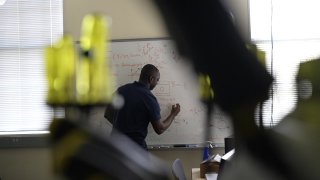
In an SMU laboratory, researchers are hoping to make big steps in space exploration with a small device.
It's a prototype sensor to measure the speed of a spacecraft entering the atmosphere of another planet, like Mars.
"This is fantastically exciting," SMU Senior Associate Dean and Professor Volkan Ötügen said. "You want your sensors to be as small and as light as possible so that there's more room for additional payload. So our sensors are miniaturized and they're extremely light."
The SMU prototype sensor is about the size of a grain of rice, roughly 250-times smaller than traditional spacecraft sensors.
Get top local stories in DFW delivered to you every morning. Sign up for NBC DFW's News Headlines newsletter.
"They take up too much space. They take up too much weight," Ötügen said. "Spacecraft need to be light to be able to throw them into space and be put into orbit."
Imagine a spacecraft is a suitcase. The payload is what you pack in that suitcase. The SMU researchers' device would leave more room for packing.
"There will be more space on the spacecraft to add more payload," Ötügen said.
Local
The latest news from around North Texas.
The SMU laboratory has had PhD, undergraduate and high school students working on the project.
"So this is also a way of getting, you know, more young people interested in science and engineering and technology, exploring not only our planet, but the outer space, other planets," Ötügen said. "Science should be an equal opportunity thing."
NASA is funding the SMU research, which still needs to be refined.
"It will make it much lighter, much smaller and more accurate," Ötügen said. "Curiosity is what brought humanity to where we are, and we're not going to sit still, right? I mean, this is one little cog in that whole big wheel!"



